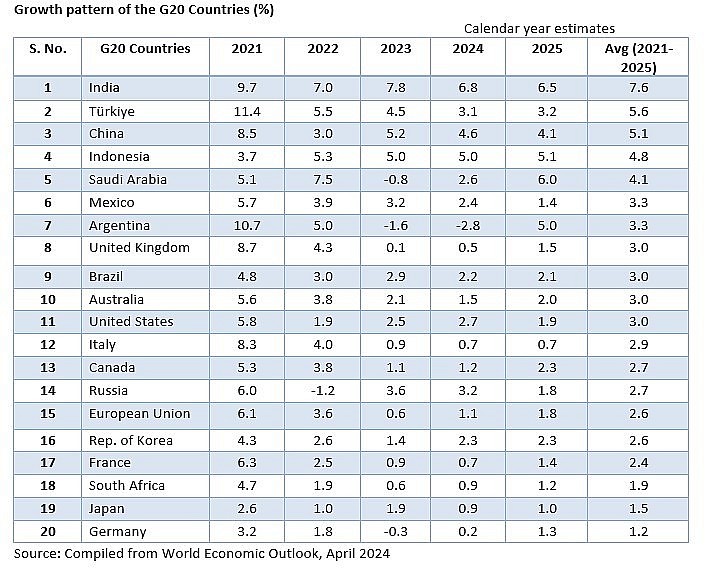India has solidified its position as a promising growth leader in the world economy, propelled by new paradigms such as the vision for a “Viksit Bharat” by 2047. In recent years, India has impressed the world with its resilient economic trajectory, achieving robust post-COVID GDP growth rates. From 2021 to 2024, India’s GDP grew by 9.1%, 7.2%, and 8.2%, respectively, averaging over 8% during this period. As the fastest-growing major economy, India is influencing the global ecosystem and attracting the new economic order towards the Global South.
India’s outstanding G20 Presidency has established the country as a global thought leader, connecting regions through initiatives like the India-Middle East-Europe Economic Corridor (IMEC). Landmark initiatives, including the Delhi Declaration, the Global Biofuel Alliance, green initiatives to mitigate climate change, and the consent for cryptocurrencies, have positioned India as a beacon of global growth. These initiatives will significantly impact the re-engineering of global value chains and contribute to the shift of the economic order towards the Global South.
As the second-largest economy in the Global South, India has garnered significant attention for its persistent efforts in promoting collective action and the development of countries in this region. During the G20 Summit in Delhi in September 2023, India successfully inducted the African Union as a permanent member of the G20, allowing African countries a direct platform to address their economic concerns with the world’s most influential nations. This expansion of the G20 since its formation in 1999 underscores India’s commitment to inclusive global economic discussions.
Representing 88% of the world’s population, the Global South encompasses Asia, Africa, Latin America, and Oceania. Within this context, countries like India, China, Brazil, Indonesia, South Africa, and Saudi Arabia have emerged as major global and regional players, navigating the world economic order. With a population of 1.43 billion, constituting around 24% of the Global South, India’s sustained and robust economic growth strengthens the economic development of the region, reducing poverty levels, addressing income inequalities, and improving the quality of life for its citizens.
India has made significant strides in poverty reduction, with approximately 250 million people escaping multidimensional poverty in the last nine years. The Poverty Headcount Ratio has seen a steep decline from 29.17% in 2013-14 to 11.28% in 2022-23, putting India on track to achieve its SDG target of halving multidimensional poverty well before 2030. The government’s unwavering dedication to improving the lives of the most vulnerable has been instrumental in this remarkable achievement, reducing multidimensional poverty in the Global South and the world.
India is on the cusp of becoming a USD 4 trillion economy by the end of the 2024-25 financial year and is poised to be the second-largest economy in the Asia-Pacific region and the third-largest in the world by 2030. According to recent IMF data (World Economic Outlook, April 2024), India leads G20 countries in growth, with an average growth rate of 7.6% during 2021-2025, followed by Turkiye, China, and Indonesia.
 |
India’s economic outlook is exceptionally positive, underpinned by strong economic fundamentals, a stable political environment, and resilient development dynamics. With a strong foundation in place, India is well-positioned to build on its strengths, foster inclusive growth, and emerge as a key navigator of economic growth on the global stage.
As the world’s most populous nation, India plays a pivotal role in global economic growth. With nearly 18% of the world’s population and a significant proportion of young people (65% under the age of 35), India boasts the largest working-age population globally. In its quest to become one of the top three economies worldwide and its journey towards “Viksit Bharat,” India has laid the groundwork for its emergence as an economic superpower in the years to come.
Village elders connect border guards and locals
Village elders have a significant role in the daily lives of the Ta Oi ethnic people in A Luoi district, Thua Thien-Hue province, so local border guards have been talking to them about deploying an effective economic model.








